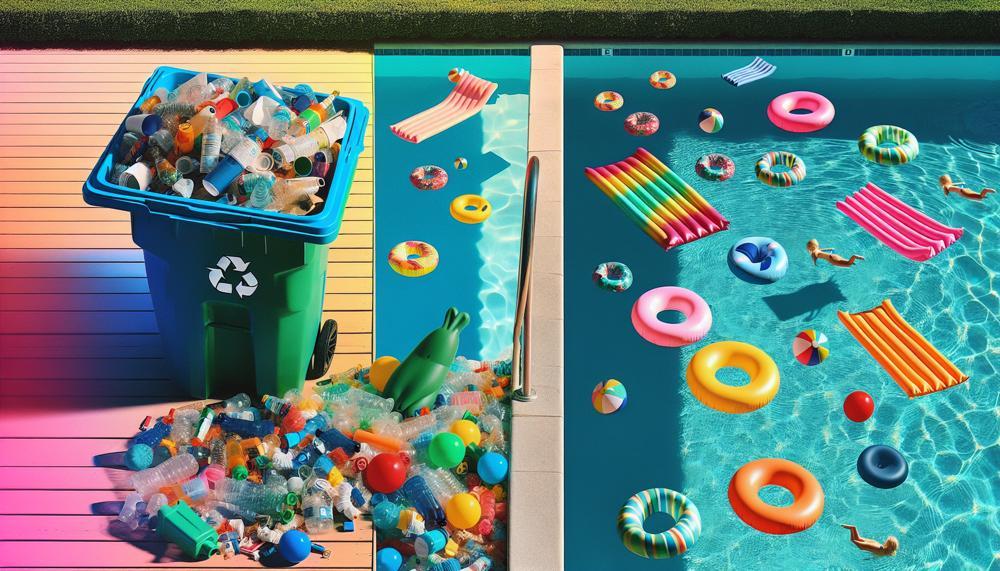The sun is shining, the birds are chirping, and the pool is calling your name. It’s time to grab your favorite pool float and soak up some rays. But amidst all the summertime fun, have you ever considered the environmental impact of these colorful inflatables?
As we become more conscious of our planet’s health, it’s crucial to examine the recyclability of our beloved pool floats.
Let’s take a dip into this topic and explore some important points:
- Many pool floats are composed of PVC, a type of plastic that is not easily recycled.
- Disposed pool floats often end up in landfills or waterways, contributing to pollution.
- However, there are now eco-friendly alternatives made from materials like recycled foam or biodegradable vinyl.
- Some companies even offer recycling programs for old pool floats.
- Properly disposing of your used pool float can make a significant difference in reducing waste and protecting our environment.
So, let’s start now.
How To Tell If They Can Be Recycled
Contents
Well, here are some things you should keep in mind:
- Check the recycling number: Most pool floats are made of polyvinyl chloride (PVC), which is coded as number 3 in the recycling system. This means that it is not easy to recycle and may not be accepted by most recycling centers.
- No recycling number: If your pool float does not have a recycling number, chances are it is not recyclable. Most recyclable materials are marked with a code for identification purposes.
- Consider repair and reuse: Instead of throwing away your pool float, why not try repairing any holes or leaks and reusing it? This not only reduces waste but also extends the life of your pool float.
- Repurpose into other items: Get creative and repurpose your old pool float into other items through arts and crafts projects. This is a fun and environmentally-friendly way to give your pool float a new purpose.
- Give it away: If you no longer need your pool float, consider giving it away to someone who can use it instead of throwing it in the trash. This not only reduces waste but also allows others to enjoy the pool float.
Find A Recycling Facility That Will Accept PVC
Finding a suitable recycling facility that accepts PVC for pool floats can indeed be a challenge, but a challenge worth taking on.
The majority of inflatable pools and pool floats are constructed from PVC, which is unfortunately not accepted at many recycling facilities.
However, there are options available for those looking to properly dispose of their PVC pool floats.
Locating a Recycling Facility:
To determine if a recycling facility will accept PVC for pool floats, the first step is to check the material’s recycling number.
This number can usually be found on the bottom or inside of the float and is represented by the symbol of three arrows chasing each other in a triangular formation.
If the number is 3, it signifies that the material is PVC and may potentially be recycled.
Next, inquire with your local recycling facility to determine if they accept PVC for recycling. It should be noted that many facilities do not accept this type of plastic due to its composition and difficulty in the recycling process.
In this case, it may be necessary to search for specialized facilities that specifically accept PVC for recycling.
Using Online Directories:
If you are facing difficulties in finding a nearby recycling facility that accepts PVC, online directories such as Earth911 or Vinyl Recycling can prove to be useful resources.
These directories enable you to search by location and specify the type of material you wish to recycle.
Alternative Options:
In the event that you cannot locate a recycling facility that accepts PVC for pool floats, there are alternative options worth considering. Up-cycling involves repurposing the float into something else, such as bags or wallets. Another option is to donate the float to someone else who may still find it useful, which is another form of recycling.
For hard walled or hardened plastic kiddie pools, check the recycling code (usually number 5) and contact your local facility for disposal options. Before disposing of an old kiddie pool, consider reusing it for other purposes such as a sandbox or planter.
Are Vinyl Pools Recyclable
Yes, vinyl pools are indeed recyclable. Let’s dive into the steps you can take to recycle a vinyl pool in your community.
Reach Out to Your Local Government
The first and most crucial step in recycling a vinyl pool is to reach out to your local city or township government. You can either call or visit their website to inquire about their policies on recycling plastic pools.
If your community does not accept them, ask if there are any designated drop-off sites nearby where you can take them.
Thoroughly Clean the Pool
Before recycling your pool, it is essential to give it a thorough cleaning. Not only will this ensure that no dirt or debris gets into the recycling process, but it will also make it easier to handle and transport.
Place on the Curb or Deliver to a Drop-off Site
Once your pool is clean, you can either place it on the curb for pick-up on recycling day or deliver it to a designated drop-off site.
If there is no curbside pick-up available in your area, be sure to check with your local government for alternative options for disposing of your pool responsibly.
Consider Other Options
If recycling is not available in your community, there are still other ways you can put your vinyl pool to good use. You can repurpose scraps of vinyl for covering a woodpile or donate the pool to a local charity or community center.
One must first check with their local government before taking any further steps. It’s essential to give the pool a thorough cleaning to ensure a smooth recycling process.
Afterward, depending on your community’s policies, you can either place the pool on the curb for pick-up or deliver it to a designated drop-off site. If recycling is not an option, there are still alternative ways to put your vinyl pool to good use, such as repurposing it or donating it.
Patch And Repair
When a pool float gets damaged, it can put a damper on any swimming activity. Fortunately, repairing a pool float is a straightforward process and can be done with just a few materials. If you want to know how to patch and repair pool floats like a pro, follow these simple steps:
-
-
- Locate the Leak: The first step in repairing a pool float is finding the leak. This can easily be done by submerging the float in water and looking for escaping bubbles.
- Dry and Clean the Area: Once you have identified the leak, dry off the pool float and clean the area surrounding the hole. You can use rubbing alcohol on a soft cloth or the included wipes from a repair kit.
- Deflate and Prepare the Float: Deflate the float and lay it flat so that the damaged area is facing up and has at least an inch of material around it.
- Use a Repair Kit: To patch and repair your pool float, you will need a repair kit specifically designed for vinyl pool floats. These kits are readily available at most pool supply stores or online.
- Prepare the Area: Before applying the patch, it is important to prepare the area according to the instructions provided in the repair kit. This may involve sanding down the damaged area or applying adhesive.
- Apply the Patch: Once the area is properly prepared, carefully follow the instructions on the repair kit to apply the patch over the damaged area.
- Allow it to Cure: After applying the patch, allow it to fully cure before inflating and using the pool float again.
-
The necessary materials for patching a pool float include:
-
-
- Vinyl Pool Float Repair Kit
- Rubbing Alcohol or Cleaning Wipes
- Sandpaper (if required by repair kit)
- Adhesive (if required by repair kit)
-
In addition to repairing pool floats, proper maintenance is key in preventing future damage. This includes storing them properly when not in use, avoiding sharp objects or rough surfaces, and regularly cleaning them.
Up-Cycling
There are countless creative ways to repurpose old pool floats, such as using them as cushioning material, transforming them into storage bins, or even repurposing them into stylish outdoor seating options. These can also be used as a floating island for pool parties or transformed into unique home decor items.
By finding new uses for old pool floats, we not only reduce waste but also contribute to a more sustainable environment.
Up-cycling is an excellent way to breathe new life into old items and reduce our ecological footprint. For example, instead of buying expensive cushioning material for packaging, we can use old pool floats to protect fragile items during shipping. This method not only saves us money but also helps reduce the amount of waste sent to landfills.
Additionally, old pool floats can be transformed into unique and eye-catching home decor items. By incorporating these bright and colorful pieces into our home design, we can add a playful touch to any room. This not only adds personality to our living space but also reduces the need to purchase new decor items, ultimately saving us money and reducing our environmental impact.
Furthermore, old pool floats can be repurposed into a floating island for pool parties. By combining multiple floats together, we can create a spacious and comfortable area for people to relax and enjoy the water. This up-cycled island not only adds an element of fun to any pool party but also reduces the need for purchasing expensive pool furniture.
Gift It To Someone
No, pool floats cannot be recycled in the conventional sense due to being made of non-biodegradable PVC. Nevertheless, they can be repurposed or gifted to someone else instead of ending up in a landfill.
Repurposing pool floats as a gift for someone is a creative and environmentally-friendly solution. Rather than purchasing new pool floats every season, giving them as gifts to friends and family can extend their lifespan and reduce waste. It also adds a personal touch and shows thoughtfulness towards the recipient’s interests.
One way to give a pool float as a gift is by personalizing it with the recipient’s name or favorite design. This not only makes it unique but also adds sentimental value and encourages them to use it for longer. Another option is to pair the pool float with other related items, such as sunscreen, pool toys, or a beach towel, for a complete summer-themed gift package.
To make the gifting experience even more sustainable, consider using eco-friendly wrapping options such as recycled paper or fabric. This adds an extra layer of thoughtfulness and reduces the environmental impact of your gift.
How Do You Dispose Of A Kiddie Pool
These include donating or selling the pool, repurposing it for other uses, contacting your local waste management facility or recycling program, and as a last resort, disposing of it in a landfill. Let’s dive into each of these options in more detail.

| Method | Explanation |
| Donate or Sell | If your kiddie pool is still in good condition, consider donating it to a local charity or selling it to someone who may need it. This not only disposes of the pool responsibly but also helps someone else in need. |
| Repurpose | If your kiddie pool is no longer suitable for swimming, consider giving it a new purpose. You can use it as a sandbox for children, storage bin for outdoor items, or even a makeshift pond for your backyard. |
| Contact Your Local Waste Management Facility | Some waste management facilities have specific guidelines for disposing of large plastic items like kiddie pools. Contact them to inquire about their policies and any special disposal services they may offer. |
| Check with Your Local Recycling Program | While most inflatable and plastic kiddie pools are not recyclable, some municipalities have recycling programs that accept certain types of plastic. Check with them to see if your pool can be recycled. |
| Last Resort: Landfill | If none of the above options are available, the last resort would be to dispose of your kiddie pool in a landfill. However, try to minimize the impact by breaking it down into smaller pieces and disposing of it in a designated landfill for construction and demolition debris. |
In addition to these methods, there are some other important factors to consider when disposing of a kiddie pool. For example, if your pool contains water or chemicals, be sure to drain and properly dispose of them before getting rid of the pool itself. This will prevent any potential harm to the environment.
Are Vinyl Pools Recyclable
Yes, vinyl pools can indeed be recycled. Recycling is a fantastic way to reduce waste and help the environment. In this section, we will discuss the steps you can take to recycle your vinyl pool and give it a new life.
Steps to Recycle Vinyl Pools:
-
-
- Check with your local government: The initial step in recycling your vinyl pool is to inquire with your local city or township government. Some communities have specific recycling programs for plastic pools, while others may not. If your community does not have a recycling program for vinyl pools, ask if there is a nearby location that will accept it.
- Clean the pool: Before recycling your vinyl pool, it is crucial to thoroughly clean it to eliminate any dirt or debris from the surface. This will ensure that the pool can be properly recycled.
- Leave on curb or deliver to designated drop-off site: Once your pool is spotless, you can either leave it on your curb for pickup or deliver it to the designated drop-off site for recycling. If you are leaving it on your curb, make sure to follow your community’s guidelines for large item pickup.
- Repurpose the vinyl: If there are no options for recycling your vinyl pool, consider repurposing it instead of disposing of it in a landfill. You can use scraps of vinyl for covering a wood pile or other creative projects.
- Haul to a local recycling facility: Lastly, if all else fails, you can haul your vinyl pool to a local recycling facility. They will be able to properly recycle the material and give it a new life.
-
Conclusion
As summer beckons and pool season kicks off, it’s crucial to consider the environmental consequences of our beloved pool floats. While many are crafted from PVC, a type of plastic that is not easily recyclable, there are now eco-friendly alternatives available.
Properly disposing of old pool floats can make a significant difference in reducing waste and protecting our planet.
When determining if a pool float is recyclable, checking the recycling number and exploring alternative options such as repair, repurposing, or donation are key. Finding a recycling facility that accepts PVC may require some research, but online directories and reaching out to your local government can be helpful resources. If recycling is not an option, fear not. There are still ways to give your vinyl float a second life.
In addition to being mindful of disposal methods, knowing how to patch and mend pool floats can extend their lifespan and reduce waste. With just a few materials and simple steps, you can fix leaks like a pro.
By taking these small yet impactful steps towards sustainability when it comes to our pool floats, we can all make a positive impact on the environment for future summers to come.






